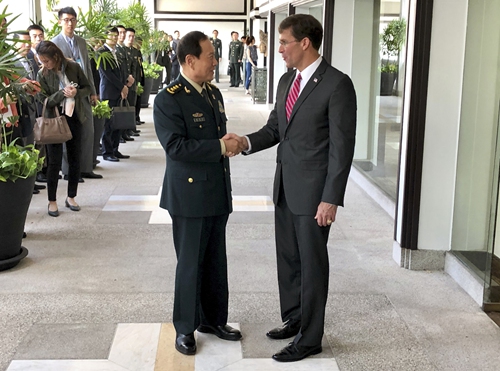HOME >> CHINA
Military relations a stabilizer of China-US ties: spokesperson
By Deng Xiaoci, Liu Xuanzun and Zhang Hui Source:Global Times Published: 2019/11/18 23:13:40

Chinese Defense Minister Wei Fenghe (left) greets US Defense Secretary Mark Esper in Bangkok, Thailand on Monday. The two held their first face-to-face talks Monday. Photo: AP
Chinese Defense Minister Wei Fenghe and US Secretary of Defense Mark Esper met for the first time on Monday as the two discussed topics involving Taiwan, South China Sea and Hong Kong.Chinese experts said that the meeting will boost military mutual understanding and let the US know China's bottom lines so as to eliminate potential strategic misjudgments by the US.
During the closed-door talks between Wei and Esper, on the sidelines of a gathering in Bangkok of defense ministers from 18 countries, both agreed that military relations are a crucial part of China-US ties, and that the two militaries should make joint contributions to cooperation and stability.
Wei told Esper that China has always adhered to peacefully resolving the Taiwan question, but will not tolerate a major "Taiwan secession" event, and that the US should handle the issue with care and should not destabilize the Taiwan Straits.
Wei also reiterated China's firm determination to safeguard territorial sovereignty, including marine rights and interests in the South China Sea, and asked the US to stop flaunting force and escalating tensions.
"We agreed to keep talking and engaging frequently," Esper told reporters afterward in a brief exchange. "We continue to make progress on any number of issues," Reuters reported on Monday.
It was the first meeting between Wei and Esper, who became the Pentagon chief in June.
The meeting shows maintaining good military ties has a very positive influence on the overall relations between the two countries, and the two countries still have much more room for military cooperation, analysts said.
Wu Qian, spokesperson of the Ministry of National Defense, said in a statement sent to the Global Times that the meeting between the two defense ministers was "positive and constructive," as they exchanged views on relations between the militaries, including international and regional issues of common interest.
The two sides agreed military relations are an integral part of China-US relations, the sound development and stability of which is to the advancement of not only the two countries' defense but also international and regional peace and stability.
Defense departments and militaries from both sides should implement the agreements reached by Chinese President Xi Jinping and US President Donald Trump, to keep regular communication, deepen pragmatic cooperation and manage and control disagreements properly, so as to make the relations between the two militaries a "stabilizer" for China-US relations, according to Wu.
Wu said that Wei and Esper both expressed a positive attitude toward the coming exchange activities between the two militaries, stressing that both sides should plan the major exchange subjects for the next year.
For the next step, the two militaries will continue communication about related arrangements, Wu said.
China expressed its firm stances and warned the US to refrain from giving any wrong signal to Taiwan and Hong Kong secessionists, in order to prevent the two militaries from being affected, Song Zhongping, a military expert and TV commentator, told the Global Times on Monday.
As China has stated clearly and formally the bottom lines of China's stance on those matters during the event, Washington could and should have a better understanding of Beijing's stance, which is a crucial way to eliminate the wrong strategic misjudgments, a key part of strengthening military ties, said Li Haidong, a professor at the China Foreign Affairs University's Institute of International Relations in Beijing.
Manifest of China's determination
Although the details of the exchange over Hong Kong-related matters was not elaborated in the statement acquired by the Global Times, it marked another commitment to resolve the issue made by China in a bilateral talk setting, which came on the heel of Xi's remarks on Thursday, showing the country's determination to settle Hong Kong's unrest, observers said. Xi addressed the 11th BRICS leader summit in Brazil that "the most pressing task for Hong Kong is to end violence and restore order."
"China sent a stern warning to the US through the meeting between Wei and Esper that the US should not misjudge the situations, support secessionists and challenge China's core interests," Song noted.
The US has stepped up provocations of China's core interests in the Taiwan Straits, the South China Sea and Hong Kong affairs, which sent wrong signals to those region's secessionists and severely undermined China's stability, sovereignty and territorial integrity, he said.
Liu Weidong, a research fellow with the Chinese Academy of Social Sciences' Institute of American Studies, told the Global Times on Monday that "unlike South China Sea and Taiwan Straits, Hong Kong is far from a place for potential conflicts for two militaries."
Newspaper headline: Defense chiefs meet